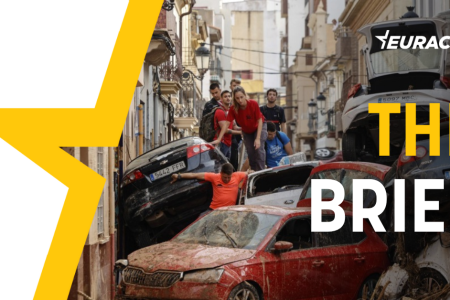
It is not every day that an EU country lives through a major cataclysm. In flood-hit Spain, drama piles up like cars blocking the streets.
Europeans on Sunday saw shocking footage of angry crowds confronting King Felipe, shouting “murderer” at him in Paiporta, Valencia, a town badly affected by flash floods earlier this week. A mud-stained Queen Letizia was seen crying.
“This is just unprecedented,” a BBC reporter said, “people are picking up mud and throwing it at the king.”
Other footage shows the car of Prime Minister Pedro Sánchez smashed by angry citizens, as they felt abandoned by the authorities. He was due to accompany the King during his visit to Paiporta but was forced to turn back after his entourage was attacked.
Sánchez said the government was sending 10,000 soldiers and police to the region of Valencia, but local people said they were left on their own.
“Please, the dead are still in the garages. The families are looking for their relatives and friends. Please come, we only ask for help (…) All we wanted was to be warned and we would have been saved,” yelled one resident.
The King, alongside Queen Letizia were due to visit another flood-struck area, Chiva – but this was postponed. He behaved bravely, saying he understood the anger and frustration of those hit by the flooding.
The official death toll has risen to 217, of which many are unidentified, but hundreds remain missing.
The devastating floods began Tuesday amid heavy rain in southeast Spain, quickly overtaking streets and trapping people in cars and businesses. The Valencia region received the equivalent of a year’s worth of rainfall in just eight hours, according to the State Meteorological Agency.
The flooding swept away cars, turned village streets into rivers and disrupted rail lines and major roads, in the worst natural disaster to hit the nation in recent memory.
Reports indicate that Valencia’s regional civil protection did not send out cell phone warnings — a so-called ES Alert — until around 8pm on Tuesday. Rivers overflowed and bridges were destroyed, with most of the deaths probably occurring well before that.
The central government has said issuing alerts to the population is the responsibility of regional authorities. But the Valencia authorities have said they acted as best they could with the information available to them.
Critics blame the central government of Sánchez, which avoided from the first moment declaring an alert 3 that would put the responsibility of the management in his hands. He has maintained the level 2 warning grants the capacity of management autonomically to the government.
Overall, the authorities’ response in the most affected areas remained minimal. Three days after the tragedy, the worst-hit areas still lack electricity, water, or food.
It was the people of Valencia who mobilised and decided to walk (cars were not allowed) to deliver food and water, as well as shovels, brooms, and other tools to help clean the areas still filled with water and mud.
A huge source of discontent is the unknown fate of missing people, family members and friends, estimated to be in the hundreds, many suspected to be trapped inside underground garages. Another is the fear of epidemics.
The search for people still missing in the Valencia region is continuing – the Spanish Civil Guard says it has deployed more staff, with dogs and drones being used.
It may sound like a cliché, but a different Spain could emerge from this disaster. It may have been a natural catastrophe, but there was also man-made negligence, mistakes and miscalculations, all of which aggravated the natural hazard.
Spaniards will also do a favour to their European counterparts by leaving no stone unturned to identify what went wrong, which authorities malfunctioned, and how things should be organised differently, to minimise the consequences the next time nature strikes.
One example is the safety features of cars, which proved to be the worst trap for many innocent victims. According to reports, people trapped inside their cars with power down were unable to escape, unable to open the car doors or the windows. Obviously, car safety needs to be reviewed on a global scale.
“Gouverner, c’est prévoir” (to govern is to foresee) – is a saying contradicting the argument that man is too small when facing the force of nature.
Scientists have warned that extreme weather events will become more frequent in Europe due to climate change. Meteorologists have pointed to the warming of the Mediterranean, which increases water evaporation and plays a key role in making torrential rains more severe.
Spaniards will inevitably hold their politicians accountable, which will be a legitimate political process and will follow its course.
We give you energy news and help invest in energy projects too, click here to learn more
Crude Oil, LNG, Jet Fuel price quote
ENB Top News ENBEnergy DashboardENB PodcastENB Substack
Energy News Beat
